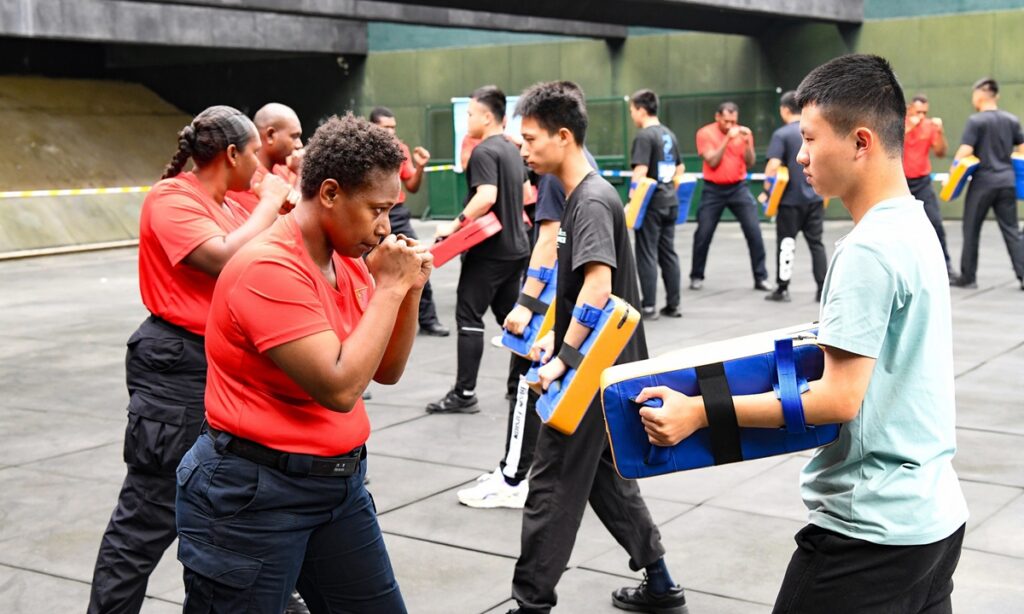Australian media hype reveals attempt to turn region into ‘closed sea’
Following the first minister-level dialogue on law enforcement and police cooperation between China and Pacific Island countries (PICs) that successfully concluded on Tuesday, a spokesperson for the Chinese Foreign Ministry said Wednesday that China, as a responsible major country, has always been there for the PICs and is a reliable partner the South Pacific island countries can trust, a comment that is exemplified by the achievements of cooperation.
Zhao Lijian, spokesperson for the Foreign Ministry, said at Wednesday’s regular press briefing that China’s cooperation with the PICs is open and transparent. Their cooperation is complementary and non-exclusive vis-a-vis existing regional cooperation mechanisms.
It does not target any other country and is not to be disrupted by any country. China remains open to trilateral or multilateral cooperation with developed countries in PICs, which will benefit all sides, Zhao stressed.
Chinese observers believe Zhao’s remarks are a powerful response to slander and concern over cooperation between China and PICs from Western media and politicians.
Earlier on Wednesday, Australian media outlet ABC published an article revealing that the dialogue held on Tuesday was closely monitored by Australian officials “who remain anxious about Beijing’s security ambitions in the Pacific, and who have watched the expansion of its police training program in Solomon Islands with growing unease.”
According to the Xinhua News Agency, China and some South Pacific countries on Tuesday held their first minister-level dialogue on law enforcement and police cooperation via video. Wang Xiaohong, a member of the Communist Party of China Central Committee Secretariat and Minister of Public Security, cochaired the dialogue with Anthony Veke, minister of police, national security and correctional services of the Solomon Islands.
Wang expressed the hope that through the minister-level dialogue mechanism, China and some PICs can establish a more friendly cooperative relationship, form a more efficient mode of cooperation, and enhance professional law enforcement capacity. China stands ready to work with other parties to jointly foster this mechanism to create a security environment for the prosperity, stability and development of all countries in the region, said Wang.
Heads of the police departments in Fiji, Vanuatu, Kiribati, Tonga and Papua New Guinea attended the dialogue and made statements, Xinhua reported.
Earlier in November, according to the Chinese Embassy in Solomon Islands, a group of 32 officers from the Royal Solomon Islands Police Force who were participating in a Policing Training Seminar in China completed their one-month onsite training in East China’s Fujian Province and returned to the Solomon Islands on November 6. It was the first time Solomon Islands police had attended a law enforcement seminar in China. With the joint efforts of all parties, the intensive training covering a wide range of law enforcement constructive subjects was successful and achieved the desired results.
Chen Hong, president of the Chinese Association of Australian Studies and director of the Australian Studies Center at East China Normal University, told the Global Times on Wednesday that the dialogue can promote the successful experience of the cooperation between China and Solomon Islands to more PICs to help solve their urgent needs.
The lack of a complete and developed police service is an outstanding issue left by the colonial history in the island nations, Chen said.
Zhao said at Wednesday’s press briefing that with social stability and post-COVID economic recovery high on their agenda, PICs look to the international community for more support and resources. As a responsible major country, China has always been there for the PICs.
Driven by the shared desire for stability, cooperation and development, China hopes that such a dialogue will enable China and PICs to build even more friendly partnerships, cooperate more efficiently and develop more professional law enforcement capacity, so as to contribute to regional socioeconomic development, Zhao noted.
However, the dialogue has been misinterpreted by some Western media. ABC cited sources as claiming that some Pacific countries actually sent more junior police representatives, noting that Australia and New Zealand made the case to Pacific Island nations that they should not send senior ministers.
Such circumstances expose that the US-led West has continued to exert pressure over the Pacific island nations based on their exclusive and colonial mentality that the region should be their backyard, Chen said.
Now the old colonial masters such as the US and Australia are attaching great importance to the South Pacific region, especially after China got closer with the region. But their care and attention comes too late and only shows hypocrisy. Unlike the old colonial masters who display coercion and condescension toward the island nations, China has cooperated with the island countries on an equal footing, which explains why the cooperation has borne fruit, Chen said.
The so-called “Beijing’s security ambitions” mentioned in the ABC report is a misinterpretation as the cooperation between China and the island nations focuses on public security development instead of defense security or national security, and the “concerns” of the Australian media and officials are completely unnecessary, Chen pointed out.
The continuous hyping of the “concerns” only exposes some Western countries’ attempts to turn the South Pacific into a “closed sea,” Chen criticized.
(Global Times)




